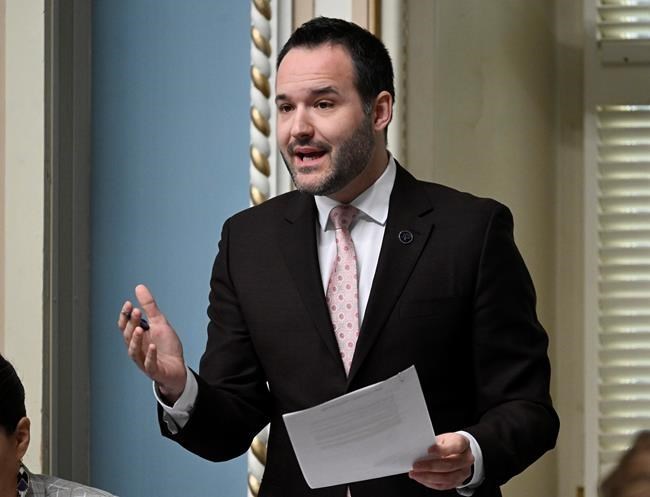
Quebec Culture and Communication Minister Mathieu Lacombe responds to the Opposition during question period, Wednesday, April 26, 2023, at the legislature in Quebec City. Quebec is considering legislation to boost French content on streaming platforms as it seeks to fight back against the overwhelming influence of American digital culture and corporations.THE CANADIAN PRESS/Jacques Boissinot
February 03, 2024 - 4:00 AM
MONTREAL - Quebec intends to legislate to boost French content on streaming platforms as it seeks to push back against the overwhelming influence of foreign digital culture and corporations.
In a report published last week, a committee appointed by the provincial government outlines 32 recommendations for Quebec to achieve that goal and counter what the authors call the hegemony of English-language content on such platforms as Apple TV and Spotify.
The committee cites a recent study by Quebec's statistics agency that shows English dominates among Quebecers' music streaming habits: of the 10,000 most listened-to songs in the majority francophone province in 2022, 85.7 per cent were in English.
"The current situation in Quebec is increasingly alarming," the committee writes. "If no action is taken, the very vitality of our cultural ecosystem will be compromised."
At the core of the committee's recommendations is a new law to create a "fundamental right to access and discover original cultural content in French," enshrined in the provincial charter of rights. It says that legislation should provide a framework to regulate digital platforms, including a minimum quantity of French-language results in algorithmic recommendations and possible quotas for French content.
In an interview Friday, Quebec's minister of communications and culture, Mathieu Lacombe, committed to introducing a bill in the coming months with the aim of getting digital platforms to offer more French content to customers in the province. He said he was studying the committee's recommendations but couldn't say which measures the bill would include, nor whether the proposed addition to the Quebec charter of rights would be among them.
The Association québécoise de la production médiatique, an organization that represents more than 160 film, television and web production companies in Quebec, called the strategies presented by the committee an encouraging step toward a greater representation of local creators and French content online.
Association president Hélène Messier says greater visibility of that content could provide a financial boon and a global showcase for Quebec talent.
"The streaming giants dominate with a culture that is often American," she said in a phone interview. "But I think it's important to make room on all platforms for cultural expressions that are different."
However, University of Ottawa law professor Michael Geist says Quebec risks achieving the opposite effect if it enacts regulations that scare platforms out of the province. "I think there is a balance to be struck," he said in an emailed statement. "If the regulatory costs of operating in Quebec become too high, the services will block the market altogether, leaving Quebec consumers with fewer cultural choices."
The report authors argue that Quebec's position will be stronger if it doesn't act alone. Several of their recommendations encourage the province to build an alliance with other francophone states to promote linguistic diversity online and set common standards for platforms. International co-operation would promote an exchange of French content between jurisdictions, the committee says.
"The rules for disseminating culture have changed profoundly, and these new practices give a disproportionate amount of power to a certain type of culture, which is generally thought of in terms of American language and references," Université Laval law professor and report co-author Patrick Taillon said in an interview. The other three committee members were former Parti Québécois cabinet minister Louise Beaudoin, diplomat Clément Duhaime and Université Laval law professor Véronique Guèvremont.
"Digital life is no different from normal life, it's not an enclave sheltered from the law, it's not the Wild West," Taillon continued. "The life we lead in the digital world must be regulated like the rest of our activities. That's the case for Quebec and other states, too."
Geist warns any future Quebec law could face a constitutional challenge if it encroaches on the federal power to regulate broadcasting.
But report authors insist Quebec has the legal means to regulate culture in a way that complements federal law. And solidarity between francophone states would make it more difficult for platforms to altogether withdraw from those markets, Taillon said.
The report advises building flexibility into provincial legislation, for example by leaving it up to platforms to decide how best to promote French content and offering alternative measures, such as financial support for local creators, to platforms that fail to include French content on their sites.
Taillon said the risk that platforms could pull out of the province deserves consideration. "But at no time should this possibility lead us to remain passive and not to act," he said.
Apple, Spotify and Netflix did not immediately respond to messages seeking comment.
This report by The Canadian Press was first published Feb. 4, 2024.
News from © The Canadian Press, 2024